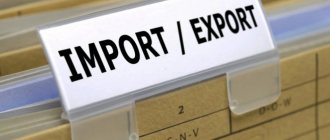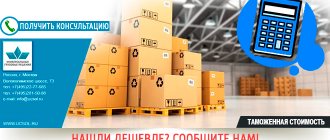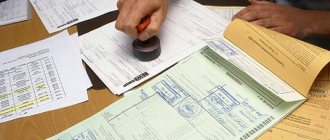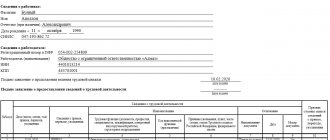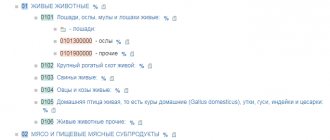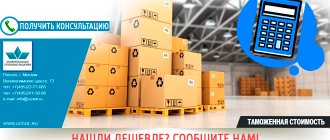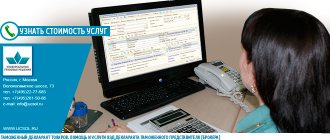When an importer (or exporter) intends to clear a product through customs, he must declare its value. It includes not only the purchase price from the manufacturer or the cost price, but also transportation costs, taxes paid, and other payments. When selling goods to the final buyer, the seller includes these costs in the selling price so that the proceeds cover them. But at customs, entrepreneurs tend to underestimate the costs of importing/exporting goods in order to pay less duty. To prevent this, customs adjusts the cost of imported and exported goods.
How customs recalculate the price of goods
Suppose two importers bring a truckload of frozen fish from Norway to customs on the same day. The first declares in the declaration that his fish costs 500 thousand rubles, the second - 1 million rubles. Customs suspects the first of undervaluing the price and raises the price of the fish to 1 million rubles, similar to the second entrepreneur, adjusting the price of the transaction with identical goods. The following price change methods are also used:
- at the cost of purchase/sale of imported goods;
- at the cost of purchase/sale of similar goods;
- method of adding (or subtracting) costs;
- other methods.
Usually, the first two methods are sufficient for customs officers. Addition-subtraction is used if the entrepreneur forgot to provide documents for the declaration or filled it out incorrectly. Other methods are used if the goods are piecemeal and rarely pass through Russian customs.
Features of calculating “customs” VAT
By virtue of paragraphs. 4 paragraphs 1 art. 146 of the Tax Code of the Russian Federation, the import of goods into the territory of the Russian Federation and other territories under its jurisdiction (hereinafter referred to as the territory of the Russian Federation), for the purposes of Ch. 21 of the Tax Code of the Russian Federation is recognized as subject to VAT. The exception is operations for the import of goods, the list of which is defined in Art. 150 of the Tax Code of the Russian Federation as a list of transactions that are not subject to taxation (exempt from taxation). According to paragraph 5 of Art. 160 of the Tax Code of the Russian Federation, the total amount of “import” VAT is calculated as the percentage of the tax base corresponding to the tax rate, calculated on the basis of Art. 160 Tax Code of the Russian Federation. In the form of a formula, calculating the amount of “import” VAT looks like this:
VAT = (TST + VTP + A) x 10% (or 18%),
where TCT is the customs value of goods;
ICT - import customs duty;
A - excise taxes.
Thus, a feature of the calculation of customs VAT (a feature of the taxation of operations for the import of goods into the territory of the Russian Federation) is that the amount of VAT paid at customs depends on the amount of the customs value of imported goods, determined according to the rules established by the customs legislation in force within the Customs union.
For your information. In connection with the formation of the Customs Union, issues of the customs value of goods are regulated by the Agreement on Determining the Customs Value of Goods Moved through the Customs Territory of the Customs Union (hereinafter referred to as the Agreement), and Chapter. 8 TK TS.
The procedure for adjusting the customs value of goods
Customs officers change the price only if they suspect the entrepreneur of hiding the real price of the cargo. For example, an importer has submitted a declaration for the import of fresh frozen fish, but in his container he has fresh, chilled fish, which is much more expensive. Or, before importing, the entrepreneur had to spend money on obtaining a license (insurance, brokerage services) - but he hid it. Since customs does not have the right to delay the import of goods permitted by law after acceptance of the declaration, the goods are issued to the entrepreneur. But in such situations, the owner of the cargo leaves a security payment to customs. After this, customs officers begin checking. They ask you to show:
- contract for the supply of goods;
- payment documents;
- supplier price list;
- price for goods in Russia;
- other documents.
Customs has the right to conduct on-site inspections, seize documents and hard drives, request bank statements, and receive data on taxes paid from the Federal Tax Service. If the fact of undervaluation is proven, customs will make a decision on adjustment and recalculate duties. The money will be taken from the security deposit and the rest will be returned to the entrepreneur. If the payment is not enough, the owner of the cargo must transfer the missing funds within one day after the decision is made. The adjustment procedure can be carried out within three years after the goods are cleared at customs.
Supreme Court: refund of customs duties is possible within 3 years
On May 14, 2021, the Supreme Court adopted ruling No. 307-ES19-18595 in case A56-122276/2018.
The essence of the dispute
The importing company imported goods into the Russian Federation in February-March 2021 and paid customs duties. Customs began to doubt the authenticity of the declared customs value. A cost control was carried out, as a result of which the company was assessed additional customs duties in the amount of RUB 3,473,942.05.
The company did not agree with the decisions of customs. As follows from the judicial acts in the case, the Company tried to resolve the fate of overpaid payments, contacted the customs authorities with various complaints, statements and appeals. However, this did not bring success.
Realizing that the customs office was not going to return the money, the company appealed to the Arbitration Court of St. Petersburg and the Leningrad Region with a statement in which it asked the court to oblige the customs office to return the customs payments.
All three authorities refused to satisfy the company's demands.
The courts considered that before going to court, the Company did not comply with the mandatory procedure for submitting an application for a refund of customs duties to the customs office, and, therefore, its claims should be rejected.
In general, in my opinion, the courts followed the position of the Supreme Court itself, which was set out by it in paragraph 29 of the Resolution of the Plenum of May 12, 2016 No. 18.
However, the Supreme Court canceled all judicial acts in the case and sent the case for a new trial.
Position of the Supreme Court
The court came to the conclusion that the Company was not required to comply with the mandatory pre-trial procedure for applying to customs with an application for a refund of customs duties, since:
The company based its demands not on new evidence confirming the reliability of its initial determination of the customs value of goods, but on the absence of legal reasons for the customs authority to adjust the customs value.
And, therefore, the courts had to check the legality of customs decisions and decide on the existence of grounds for the return of customs payments.
Commentary on the Definition
In my opinion, the Supreme Court’s ruling is very important for the practice of resolving customs disputes.
To understand the position of the Supreme Court, I will briefly highlight the previously established practice.
On May 12, 2021, the Plenum of the Supreme Court adopted a resolution on the application of customs legislation.
Among other things, in paragraph 29 of the Resolution, the court indicated that the refund of customs duties is carried out on the basis of an application submitted to the customs authority. In this case, at the same time or earlier, the declarant is obliged to initiate the introduction of appropriate changes to the declaration of goods (hereinafter - DT). Otherwise, the application for a refund of payments will not be considered.
In general, this approach was consistent with the practice of arbitration courts. Even before this, the courts proceeded from the fact that the return of customs payments in court is possible only after applying to the customs office with an application for a return. The Supreme Court added to this the need to amend the DT.
What did this mean in practice?
Firstly, two applications had to be submitted to customs at the same time - both for a refund of payments and for making changes to the customs declaration.
Secondly, the courts began to consider the need to file these applications as a mandatory pre-trial procedure. Thus, if it was violated, the courts either did not accept applications for proceedings (rarely) or refused to satisfy the demands of declarants for the return of payments (often).
However, back in 2021 and 2021, the Supreme Court adopted several judicial acts in which it clarified that “regulating the issue of the refund of excessively collected tax in an administrative manner in this case is the right, and not the obligation, of the payer.” And the need to comply with pre-trial appeal to the customs authority arises when the declarant submits to customs new evidence of the reliability of the information declared in the DT.
In 2021, the Supreme Court adopted a new Resolution on the application of customs legislation (Resolution No. 49 dated November 26, 2019).
In the section devoted to the return of customs duties (clause 32), the Supreme Court, in fact, repeated the previously formed approach, according to which the return of payments is carried out subject to amendments to the DT.
However, in the paragraph, the Supreme Court explained that the interested party has the right to demand the return of customs duties directly in court. At the same time, going to court with a property claim for the return of customs duties does not imply the need to comply with the administrative procedure for the return. The stated claim must be considered by the court on its merits, regardless of whether the decision of the customs authority, which served as the basis for excessive customs payments to the budget, was challenged in a separate court.
In my opinion, the Supreme Court in paragraph 34 formulated two rules at once:
- The declarant has the right to apply directly to the court with a property claim for the return of payments, and there is no requirement to follow the pre-trial procedure (submitting an application for the return of money to the customs office);
- The request for a refund of payments must be considered on its merits even if the customs decisions that led to additional charges have not been canceled or challenged in court.
However, judging by the practice of lower courts, the question of the need to comply with the pre-trial return procedure has not become completely clear.
I tried searching the legal framework. From what I found, most of the courts still considered it necessary to comply with the pre-trial procedure for applying to customs.
However, in the Far Eastern District, the courts accepted the position of the Supreme Court (Determination dated March 22, 2018 No. 303-KG17-20407 in case A51-13978/2016). Which is not surprising! After all, the Supreme Court reviewed the case of this particular district.
conclusions
In the Determination, the Supreme Court explained in more detail its position on the return of customs duties:
- Refund of payments is possible directly in court by filing a property claim against customs.
- The pre-trial procedure for the return of payments is not mandatory if the requirements are based on the evidence that has already been disclosed by the parties at the stage of customs control.
- If the requirements are based on new evidence, then it is necessary to comply with pre-trial procedures (a) for the return of payments and (b) for making changes to the DT, since the customs authority has the right to conduct customs control of the authenticity of documents and information and verify the legality of the declarant’s actions.
Moreover, in my opinion, the Supreme Court confirmed its commitment to the approach formed by the Supreme Arbitration Court of the Russian Federation.
Its essence is that the protection of violated property rights (including in public legal relations, for example, when overpaying taxes/payments) is possible not only through administrative proceedings with its truncated deadlines for going to court, but also in fact within the framework of lawsuit proceedings within the limits of 3 years from the date of overpayment.
______________________________________________________________________
Determination of March 22, 2018 No. 303-KG17-20407 in case A51-13978/2016 Determination of May 16, 2019 No. 305-ES19-344 in case A40-15424/2018 Clause 45 of Review of Judicial Practice No. 3 (2018), approved . By the Presidium of the RF Armed Forces on November 14, 2018
How to challenge a customs adjustment in court
There is good news - the cost adjustment can be challenged through an arbitration court, and decisions on such claims are usually made in favor of entrepreneurs. You can file a lawsuit within three months after the decision on adjustment is made. But the sooner the better: if customs has begun checking the value of the cargo, it makes sense to prepare documents and a draft version of the claim.
The application must indicate the name and address of the customs authority, the date and number of the decision on the adjustment, and briefly describe the current situation. You must also provide evidence that the price you indicated in the declaration is fair. Suppose you find a manufacturer from whom you purchase goods directly, without brokers or commissions, so it turns out cheaper than your competitors. Why should you overpay at customs for your business success? Remember that the arbitration court satisfies four out of five claims for adjustment of customs duties.
Position of the financial department
The Ministry of Finance of Russia devoted Letters dated November 14, 2011 N 03-07-08/318 and letters dated November 14, 2011 N 03-07-08/318 and dated November 3, 2009 N 03-07-08/224 to the procedure for restoring deductible VAT amounts paid to the customs authority when importing goods, the collection of which was declared unlawful by the court. . It should be noted that their content is no different and the author has not encountered letters with different conclusions. All this gives reason to believe that to this day the position of the Ministry of Finance has remained the same: if, by a court decision, the collection of the amount of VAT by the customs authority is recognized as unlawful and this amount of tax is subject to return to the taxpayer by the customs authority, the taxpayer who has accepted for deduction the VAT paid on the import of goods , must submit to the tax authority an updated tax return for the tax period in which the specified tax deductions were made .
Customer Reviews
Gratitude to Konstantin Vasilievich Solovyov I am very glad that I was accepted for a consultation with Konstantin Vasilievich Solovyov. An excellent, very competent lawyer. Please accept my gratitude for your excellent service. Thank you!
Valadze G.G. 08/17/2018
Review by B.I. Goreky Gratitude to Yuri Vladimirovich from B.I. Goreky for the consultation on family rights.
Gratitude from Kikkas V.P. Kikkas V.P. I am grateful to the Legal Agency of St. Petersburg for understanding the situation and timely assistance in my seemingly hopeless situation, personally to Denis Yuryevich Stepanov, I hope to continue to cooperate.
Kikkas V.P. 08.11.2018
Gratitude from N.S. Khokhlov I am Khokhlov N.S. I express special gratitude to lawyer A.V. Pavlyuchenko who defended my consumer protection rights. I was pleasantly surprised by his professionalism, where he discovered the false address of my defendant registered in the Unified State Register of Legal Entities, and also defended me, as I believe, from the unreasonable decisions of the trial judge. If I need legal assistance in the future, I will only turn to A.V. Pavlyuchenko.
N.S. Khokhlov December 12, 2017
Gratitude from gr. Kolesnikova A.N. Let me express my deep gratitude to the Legal Agency of St. Petersburg, located at Spassky Lane, 12. For their professional and friendly assistance in resolving my issue! I wish to continue working, bringing benefit to all residents of St. Petersburg. And not only.
Kolesnikov Alexander Nikolaevich.
Position: Head of the Metro Implementation Sector
PS: Before your company, I contacted 5 companies on this issue and received unclear answers.
Gratitude from gr. Tiuntsova G. A. I asked for advice from your “Legal Agency of St. Petersburg” - regarding deception by one person who presented himself as an employee of Rospotrebnadzor of the Krasnoselsky district, Novichkov A. A. Offered me a service - before the New Year, go on a tourist trade union voucher to Moscow on the Sapsan railway transport. I refused due to the manipulation of the placement of seats - in different trains, and then by car. Lawyer Sergei Vyacheslavovich Mavrichev handled this case and provided consultations. I thank you for such a sensitive and attentive attitude in office work, which was denied at the 58th police department of the Vyborg district, under Art. 24, 144, 145 of the Code of Criminal Procedure of the Russian Federation, I now have the right to appeal the conclusion and will send an application for further investigation to the district prosecutor's office.
Tiuntsov G. A.
8
Letter of thanks
Review by G.N. Antropova To the lawyer of the Legal Agency of St. Petersburg A.V. Ermakov
I express my gratitude to you for your professionalism in protecting my interests in a criminal case, Andrey Valerievich, allow me to express my gratitude to you for your help and support. I note your high professionalism and skillful actions in defending my positions.
Best regards, G.N. Antropov
Gratitude from Loseva S.I. I express my deep gratitude to Sergei Vyacheslavovich (lawyer of the firm) for his very clear, accessible help in solving my problem (protecting rights as a consumer). This is the second time I have contacted you to solve my problems. Always everything......and in full.
With gratitude, Svetlana Ivanovna Loseva, 02/15/2019
Review by Egorova A.N. I, Egorova Antonina Nikolaevna, am very pleased with the consultation of Yuri Vladimirovich Sukhovarov. Thank you for your attentiveness and understanding. I wish you further professional growth.
Return of CTS
Return of the vehicle is possible in three cases:
- an excess amount of customs duties has been paid – this occurs if the importer paid the required amount during the CCC, but appealed the decision in court and won the case;
- it is necessary to return the cash deposit paid as security for customs payments during conditional release - the need for this arises if, after checking the documents, the initially declared customs value is accepted;
- it is necessary to return the advance payment - if it exceeds the amount that had to be paid.
In each of these situations, you must provide a package of documents and an application. The list of documents and contents of the application will differ for each case.

